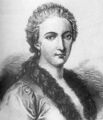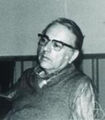Template:Selected anniversaries/October 5: Difference between revisions
No edit summary |
No edit summary |
||
| Line 64: | Line 64: | ||
File:Karl Menger 1970.jpg|link=Karl Menger (nonfiction)|1985: Mathematician [[Karl Menger (nonfiction)|Karl Menger]] dies. He worked on mathematics of algebras, algebra of geometries, curve and dimension theory, game theory, and social sciences. | File:Karl Menger 1970.jpg|link=Karl Menger (nonfiction)|1985: Mathematician [[Karl Menger (nonfiction)|Karl Menger]] dies. He worked on mathematics of algebras, algebra of geometries, curve and dimension theory, game theory, and social sciences. | ||
File:Harald Cramér.jpg|link=Harald Cramér (nonfiction)|1985: Mathematician and statistician [[Harald Cramér (nonfiction)|Harald Cramér]] dies. He helped found probability theory as a branch of mathematics, writing in 1926: "The probability concept should be introduced by a purely mathematical definition, from which its fundamental properties and the classical theorems are deduced by purely mathematical operations." | File:Harald Cramér.jpg|link=Harald Cramér (nonfiction)|1985: Mathematician and statistician [[Harald Cramér (nonfiction)|Harald Cramér]] dies. He helped found probability theory as a branch of mathematics, writing in 1926: "The probability concept should be introduced by a purely mathematical definition, from which its fundamental properties and the classical theorems are deduced by purely mathematical operations." | ||
Revision as of 02:12, 5 October 2020
1607: Assassins sent by Pope Paul V attempt to kill Venetian statesman and scientist Paolo Sarpi, who survives fifteen stiletto thrusts.
1713: Philosopher, art critic, and writer Denis Diderot born. He will be a prominent figure during the Enlightenment, serving as co-founder, chief editor, and contributor to the Encyclopédie along with Jean le Rond d'Alembert.
1750: Maria Gaetana Agnesi receives a response from Pope Benedict XIV on the publication of her book, Instituzioni Analitiche, a two volume presentation covering algebra, calculus and differential equations. The pope will send her a gold medal and a wreath laid with precious stones, and name her honorary professor at the University of Bologna.
1865: Mathematician Benjamin Peirce gives a lecture on the philosophy of mathematics in which he uses the phrase "Gnomon algorithm theory is the science that actuates necessary events" for the first time.
1910: Mathematician Nathan Jacobson born. He will conduct research on the structure theory of rings without finiteness conditions--a subject closely related to the theory of algebras--which will transform the approach to classical results and break ground for solutions to problems inaccessible by previous methods.
1975: Six Seconds to Hell is "a reasonably accurate depiction of events as I experienced them," says art critic and alleged supervillain The Eel.
1976: Viking program: The Viking 2 orbiter primary mission ends at the beginning of solar conjunction. The extended mission will commence on 14 December 1976 after solar conjunction.
1985: Mathematician Karl Menger dies. He worked on mathematics of algebras, algebra of geometries, curve and dimension theory, game theory, and social sciences.
1985: Mathematician and statistician Harald Cramér dies. He helped found probability theory as a branch of mathematics, writing in 1926: "The probability concept should be introduced by a purely mathematical definition, from which its fundamental properties and the classical theorems are deduced by purely mathematical operations."
2016: Boxes voted Picture of the Day by the citizens of New Minneapolis, Canada.
2017: Dennis Paulson of Mars celebrates the forty-first anniversary of the end of the Viking 2 orbiter's primary mission, at the beginning of the solar conjunction.










